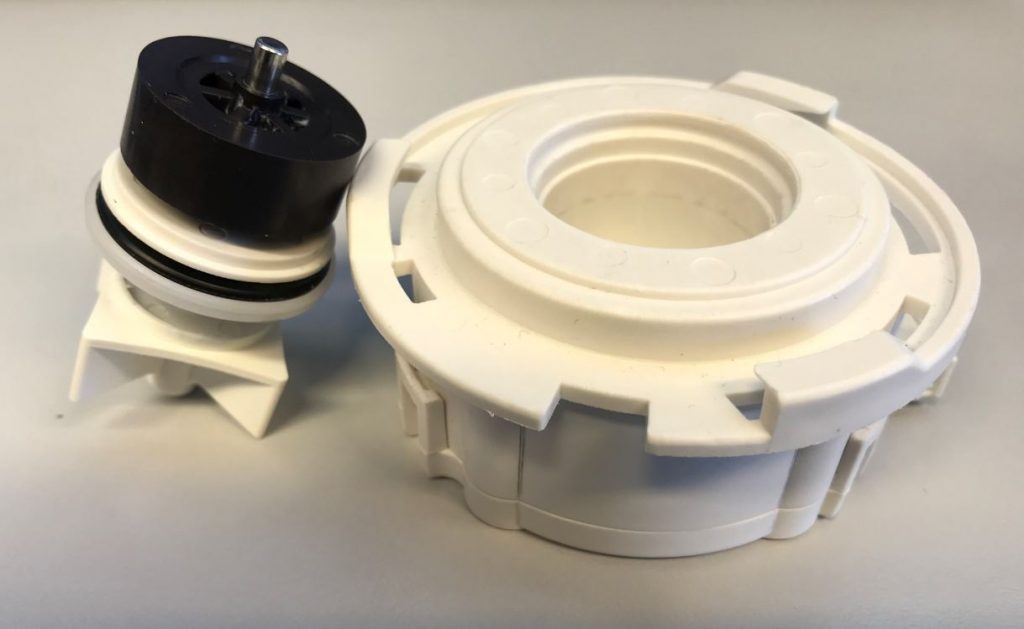Plain bearings in BLDC pumps – a Christmas story
Lars Butenschön | 24. June 2020
Plain bearings are often the unsung heroes of our everyday lives. They are at least small or big helpers that we take for granted in our day-to-day routines. This is true of plain bearings in BLDC pumps. What that is, and what that worn-out phrase about unsung heroes really means, is something I discovered one Christmas. Come with me on a journey with the Ghost of Christmas Past … and see what I learned about BLDC pumps and plain bearings.
I will remember Christmas 2019 for a long time. 7:30pm. Saturday, 21st December. “Honey, why is the dishwasher making that noise?” I asked. Broken kitchen appliances are a nightmare for me. Although my professional career has given me a great interest in technical devices and how they work, I have a strange aversion to them in private life. Especially when it’s up to me to repair something. My wife also knows little about household electronics, so she didn’t know what to do either.
One way or another. Just before Christmas. Visitors were coming. More washing up to do and more stress. I push a number of different buttons, take out the sieve and put it back in and restart the dishwasher. Nothing changes. We vaguely remember a similar case a while back. Wasn’t it something about the pump? So I checked out what laymen have made available in grainy YouTube videos from the early 2010s. Nothing worked.
My salvation arrives on 23rd December in the form of a friend of a former colleague who works at an electrical repair service. In just a few minutes, my wife and I learned quite a bit.
Plain bearings in BLDC pumps don’t have it easy.
To wash dishes, a dishwasher needs to move a lot of water. To do that, these devices normally have two pumps: a circulating pump and a lye pump. Sometimes there are also the “asynchronous combination pumps” that combine the two functions in a single component. Other pump types that are installed in various devices are circulation, distributor and heating pumps. Most of these pumps are BLDC pumps, a term that serves as an umbrella category. BLDC stands for “brushless direct current”, referring to the type of motor installed.
I had actually heard of lye pumps before. “We do those”, I told the technician and my wife proudly. My wife nodded wearily. She’s heard this enthusiasm before. By “we”, I always mean igus and our plain bearings. Inordinate pride is an occupational hazard. In any case, we, igus, have for years delivered plain bearings for lye pumps to manufacturers all over the world.

The requirements of these components are very stringent. There is cost pressure on one side and durability on the other. In between are chemical resistance and precision requirements. Lyes, or cleaning agents used in dishwashers, are no small matter. And nobody wants to take the time to maintain these parts. So the whole thing has to work for as long as possible without any external intervention.
The cause of the problem: the circulating pump
Fortunately, I didn’t have to explain the early failure of my plain bearing that evening. Even after 9 years of rinsing, the bearings in the lye pump gave no reason for complaint.
The situation was different with the circulation pump. The impeller – a small “paddle wheel”- like part had got too much clearance over the years. Of course no iglidur® bearing was installed there. In defence of the installed product, however, it must be said that the requirements for circulation pumps are also higher. Especially the switch-on times – i.e. the duration and frequency of the movements are much higher.
Fortunately, this component was a “usual suspect”. Not only was the fault found quite quickly, but the spare part was also quickly available. After much stress and running back and forth, Christmas was “saved” (presumably one does not speak unjustifiably of so-called “first world problems” for this kind of problem) and we learned something about pumps in dishwashers.
We would be happy to assist you.
Regardless of whether you need support in the correct design of plain bearings or are still in the very early stages of construction. We, i.e. igus and our application consultants in the field and office staff, will assist you – by telephone, virtual visit or at your premises and together we will find the “most cost-effective solution that works”.

